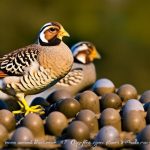Are you a quail keeper wracking your brain over the perfect veggie feast for your little beaked buddies? Creating that ideal balance of nutrition can feel like solving an intricate puzzle, especially when trying to mix in some fresh veggies for variety.
Trust me, I understand the challenge! When my own flock started giving their usual seed fare the cold shoulder, it was clear they were craving something different.
So I hit the books and scoured resources to find out what our feathered friends could enjoy safely. Turns out, quails have quite a penchant for vegetables—especially leafy greens like kale and spinach.
Through this post, I’ll share with you a banquet of vegetable options that are sure to bring delight and nutritional balance to your quail’s daily feed. It’s not just about satisfying hunger; it’s about catering to those wee palates as well! Are you ready to elevate your quails’ meals from humdrum to hooray? Let’s dive into this culinary adventure together!
Understanding Quail’s Diet
Quails have a diverse diet that consists of both plant-based and animal-based foods. They typically forage for seeds, leafy greens, insects, worms, and even meat to meet their nutritional needs.
Plant-based foods (seeds and leafy greens)
I love watching my quails peck around for seeds and grains. It’s a big part of their diet because they’re granivorous by nature. They really enjoy the variety, from millet and cracked corn to wheat and oats.
I make sure these little birds get a mix since different seeds have various nutrients.
Leafy greens add important vitamins to their meals as well. My quails go crazy for fresh lettuce, turnip greens, and spinach. Sometimes, I’ll toss in some sweetcorn or chopped up cucumber for an extra treat.
These veggies help keep them healthy and are fun for them to eat. I’ve noticed they’re quite picky though; if they don’t like something, they won’t touch it! So, keeping an eye on what disappears first gives me clues about their favorite snacks.
Animal-based foods (insects, worms, and meat)
Quails benefit from a diet that includes animal-based foods. They enjoy insects and worms, which contribute to their protein intake. Feeding quails small amounts of meat can also be beneficial for their nutritional needs.
In the wild, quails naturally forage for insects and other small creatures, making it important to replicate this in their captive diet.
Observing quail behavior is crucial when introducing these foods into their diet. Quails may pick at first but will quickly consume these animal-based foods once they recognize them as part of their diet.
Popular Vegetables Quails Enjoy
Quails enjoy a variety of vegetables, such as celery leaves, lettuce, turnip greens, broccoli, carrots, and cucumber. These vegetables provide essential nutrients and fiber for their diet.
Celery leaves
Quails enjoy munching on celery leaves for a refreshing and crunchy treat. They are rich in vitamins and minerals, making them a healthy addition to the quail’s diet. Offering celery leaves provides variety and nutrition, keeping the quails happy and satisfied.
By including celery leaves in their diet, quails get essential nutrients that contribute to their overall health. Incorporating this leafy green into their meals gives them a diverse range of textures and flavors, making mealtime enjoyable for these delightful birds.
Lettuce
Moving from discussing the benefits of offering celery leaves, I must emphasize the advantages of incorporating lettuce into your quail’s diet. Lettuce is an excellent addition to their meals as it provides hydration and essential nutrients.
This leafy green vegetable contains high water content, which aids in keeping your quails hydrated. Its crunchy texture makes it appealing for quails to peck at, providing both mental and physical stimulation, promoting their overall well-being.
Lettuce also offers a variety of vitamins and minerals that are beneficial for your quail’s health. It is a good source of vitamin A, which supports vision and immune function. Additionally, its supply of vitamin K contributes to blood clotting and bone health.
Turnip greens
Turnip greens are an excellent vegetable choice for quails. They are rich in essential nutrients like vitamins A, C, and K, as well as calcium and folate. These leafy greens provide quails with vital antioxidants to support their overall health.
Quails enjoy the crunchy texture of turnip greens and will readily consume them as part of their balanced diet. Offering turnip greens also adds variety to their meals, keeping them engaged and satisfied.
Incorporating turnip greens into your quail’s diet provides a nutritious source of roughage that aids in digestion. The high fiber content promotes healthy gut function and helps prevent digestive issues in these birds.
Broccoli
Quails enjoy eating broccoli, as it provides them with essential nutrients like fiber and vitamin C. It’s best to offer small pieces of raw or cooked broccoli to quails, ensuring they can easily pick and eat them.
Including broccoli in their diet will contribute to a balanced and nutritious meal for your quails.
When considering the other vegetables that quails prefer, carrots also stand out due to their high nutritional value. Providing a variety of vegetables ensures that quails get all the necessary nutrients for their well-being and health.
Carrots
Carrots are an excellent vegetable for quails due to their crunchy texture and sweet taste. They provide essential nutrients like beta-carotene, which is crucial for maintaining healthy eyesight in quails.
In addition, carrots also offer dietary fiber, promoting good digestion and overall health in quails.
Including carrots in the diet can help provide a balanced meal for quails, offering both nutrition and enrichment. It’s important to remember that while carrots make a great addition to a quail’s diet, they should be served in moderation alongside other fruits and vegetables to ensure a varied and well-rounded nutritional intake for these birds.
Cucumber
When it comes to vegetables, quails also enjoy cucumber as part of their diet. Cucumbers are a good source of hydration for quails due to their high water content, making them a refreshing treat, especially during hot weather.
They also provide essential vitamins and minerals like vitamin K and potassium that contribute to the overall health of your quails.
Cucumbers should be fed in moderation alongside other vegetables and fruits as they help diversify the diet of quails, ensuring they receive a well-balanced nutrition plan. It’s an excellent practice to observe your quail’s eating habits when introducing cucumbers into their diet and adjust accordingly based on their preferences.
Foods to Avoid Feeding Quails
Avoid feeding quails tomatoes, processed or salty foods, and chocolate as these can be harmful to their health. Instead, opt for fresh vegetables and fruits to keep your quails happy and healthy.
Tomatoes
Quails should avoid eating tomatoes as they contain solanine, which is toxic to them. Solanine can cause digestive issues and negatively impact their health. It’s important to keep tomatoes away from the quails’ feeding areas to prevent accidental ingestion.
Being aware of harmful foods like tomatoes ensures the well-being of your quails and supports their overall health.
Moving on to “Processed or salty foods”..
Processed or salty foods
After avoiding tomatoes, it’s crucial to note that quails should also steer clear of processed or salty foods. These items can have adverse effects on their health, leading to digestive issues and dehydration.
It’s best to stick to a natural diet and avoid introducing any processed or salty snacks into the mix.
Quails may be negatively impacted by consuming processed or salty foods, affecting their overall well-being.
Chocolate
Chocolate is harmful to quails and should never be fed to them. It contains theobromine, which can be toxic to birds like us. Eating even a small amount of chocolate can lead to serious health issues for quails, such as vomiting, diarrhea, hyperactivity, tremors, seizures, and even death.
I stay away from chocolate treats and ensure that my diet only consists of safe and healthy foods that provide the necessary nutrients for my well-being.
It’s important for quail keepers to know that under no circumstances should we be given any form of chocolate. Even though it might smell enticing or seem harmless in small quantities—chocolate poses a significant risk to our health.
Tips for Feeding Quails in Captivity
Provide a varied diet to keep quails healthy and happy, offer fresh vegetables and fruits regularly, and use a feeder to reduce waste. Read on for more helpful tips on providing the best diet for your quails!
Providing a varied diet
Quail keepers, maintaining a varied diet is vital for our quails’ health. Including a mix of vegetables, fruits, and grains ensures they receive the essential nutrients they need to thrive.
By observing their eating habits and preferences, we can adjust their diet accordingly. It’s crucial to offer a balanced mix of food to sustain the well-being of our feathered friends.
Observing your quails’ eating habits allows you to understand what foods they prefer. This approach helps in providing them with an appropriate variety that meets their dietary needs.
Offering fresh vegetables and fruits
Quails thrive on a diet that includes fresh vegetables and fruits, which should make up about 20% of their daily food intake. It is essential to provide a varied selection such as lettuce, sweetcorn, apples, and cucumber to ensure they receive the necessary nutrients.
Observing their eating habits will help adjust the diet according to their preferences for optimal health.
By offering a balanced mix of delicious greens and fruits, quail keepers can ensure their feathered friends stay healthy and content.
Using a feeder to reduce waste
I use feeders to reduce food waste, ensuring my quails eat all their grains and seeds without scattering them. Quails can be messy eaters, so using a feeder helps keep their diet clean and organized.
I also provide fresh fruits and vegetables separately to avoid contamination from the feeder.
To minimize waste, I opt for feeders designed specifically for quails. These help prevent spillage and ensure that the food is easily accessible for the birds. By using these feeders, I can efficiently manage their diet while reducing unnecessary mess and spoilage of food.
Conclusion
In conclusion, quails have diverse dietary preferences. Their diet often includes a variety of vegetables, fruits, seeds, grains, and even animal-based foods like insects and worms.
By providing a balanced diet that meets their nutritional needs, quail keepers can ensure the health and well-being of their birds. Observing the quails’ eating habits is crucial to understanding their food preferences and adjusting their diet accordingly.
Offering practical tips for feeding in captivity can lead to happier and healthier quails. Remember to offer a varied diet with fresh vegetables and fruits to enrich your quail’s meal options.
FAQs
1. What vegetables are best for a quail’s diet?
Quails love to eat leafy greens, like spinach and kale, as part of their diet because they’re full of nutrition.
2. Can quails eat all types of vegetables?
While quails enjoy many vegetables, always check if it’s safe because some might not be good for their health.
3. How do I choose the right veggies for my quail’s meal plan?
Pick fresh and clean vegetables high in vitamins to meet a quail’s nutritional needs when making meal choices.
4. Do quails need other food besides vegetables?
Yes, besides veggies, make sure your quail gets a variety of foods like seeds and insects to balance its dietary requirements.
5. What feeding habits should I know about when giving veggies to my quail?
Observe your quail’s behavior; they often prefer pecking at small pieces of chopped-up vegetables that are easy to eat.
6. Why is variety important in a quail’s vegetable options?
Offering different kinds of safe-to-eat veggies can help meet the various dietary preferences and nutritional needs that each bird has.
Meet Walter, the feathered-friend fanatic of Florida! Nestled in the sunshine state, Walter struts through life with his feathered companions, clucking his way to happiness. With a coop that’s fancier than a five-star hotel, he’s the Don Juan of the chicken world. When he’s not teaching his hens to do the cha-cha, you’ll find him in a heated debate with his prized rooster, Sir Clucks-a-Lot. Walter’s poultry passion is no yolk; he’s the sunny-side-up guy you never knew you needed in your flock of friends!




